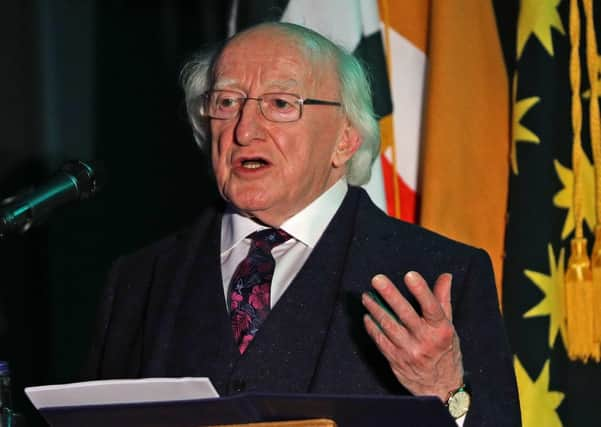By telling history minus a unionist perspective, Irish president Higgins cements partition


He has also called on the people to reject “conscious or unconscious amnesia” and said that “the exercise in remembering must be open to all perspectives”.
Except, in his “exercise in remembering”, there is no unionist perspective. In fact, whether it be the Dublin media, the arts, sports, historians, third sector or politics, there is no unionist perspective.
Only amnesia.


Advertisement
Hide AdAdvertisement
Hide AdOnly an enduring isolation and denunciation, and even demonisation of the unionist perspective.
Instead of ethical remembering, by focusing on one side of history and forgetting the other, the President of Ireland is in fact engaging in irresponsible remembering.
He is burnishing nationalist sentiment and encouraging mistrust of unionism and the British, and alienating unionists.
In his centenary statement looking at the Sack of Balbriggan (something I condemn to the fullest and highest degree) he made two broad points.
Advertisement
Hide AdAdvertisement
Hide AdFirst, he wrote, “Reprisal-based violence was a key element of the British military imperialist strategy in the Irish War of Independence.”
This statement and the words that followed suggested that only the British were capable of reprisals and atrocities. Nothing could be more false.
After the awful events in Balbriggan the Liverpool IRA sought “an eye for an eye”, as Irish historian Gerard Noonan said. On November 27th 1920 the IRA carried out over 40 arson attacks around Merseyside in Liverpool, ending in more than £500,000 damage and the death of a civilian.
One hundred years ago all across the island of Ireland the IRA engaged in reprisal attacks and atrocities. To suggest that reprisals and atrocities were the reserve of only the British is gravely irresponsible.
Advertisement
Hide AdAdvertisement
Hide AdIf people are doing any sort of responsible and ethical remembering it should not be a surprise that unionists supported the RIC, and all across Ireland RIC men were shot and barracks attacked mercilessly, including in unionist areas of Ulster.
The affect on the unionist psyche then, it would be hard to express. Does that not warrant remembering? And we saw when the Irish state tried to remember the RIC it caused national hysteria, a sentiment drummed up and driven home by Sinn Fein.
The Bureau of Military History recorded a conversation between General O’Duffy and Frank Aiken who led the IRA in Tyrone and Armagh in 1921, and discussing burning Orange and unionist homes they said:
“When you hit them hard they will not strike again.”
Aiken then said: “Well, burn them and their houses.”
This tells us that reprisals were a key element of republican military strategy. Why would the president of Ireland mention Balbriggan and not Altnaveigh when Frank Aiken, later minister of foreign affairs in Dublin, led an IRA attack that burnt 12 houses in a Presbyterian farming community, shooting men and women in what has been recorded in history as a “reprisal”.
Advertisement
Hide AdAdvertisement
Hide AdThen the president wrote, “Their use [of reprisals] is rooted in ideological assumptions, of superiority and inferiority in terms of race, culture or capacity, in the notion of the collective as a disloyal, hopeless or threatening version of the ‘Other’.”
To start. The IRA attacks on GB avoided Scotland or Wales, because the people were “more or less Gaelic”, as IRA leader Liam Lynch put it. This perspective is based on notions of ethnic difference and Gaelic superiority.
This idea of Irish Gaelic ethnic exceptionalism has been all to real in history and endures to this day.
Rev. Michael Kennedy, Roman Catholic curate, said in April 1898:
Advertisement
Hide AdAdvertisement
Hide Ad“They are not born from our race...the Irish Unionists have no country...”
Cardinal Cullen said:
“Irish protestants are foreigners and not part of Ireland.”
Eamon de Valera said during the War of Independence that Protestants were “not Irish people.” And Garrett Fitzgerald said that in Ireland’s revolutionary age there was a kind of “counter-sectarianism that came close to a form of racism.”
Sean O’Faolain said in The Irish:
“In my youth [the] rigorous priest was commonplace... Any man or woman who married a Protestant was a good as damned. Any Catholic who attended a Protestant funeral or marriage was sent direct to the Bishop of his diocese for forgiveness.”
Advertisement
Hide AdAdvertisement
Hide AdNo one should make light of the affect these sentiments, official injunctions and customs had on society and community relations.
Why are these ideological assumptions of Gaelic superiority forgotten and subject to amnesia?
Michael D should remember that republicans have long made unionists the ‘Other’, something illegitimate and alien. There should be no amnesia of that dehumanisation and what its worst expressions were capable of.
We are in delicate times right now. Anglophobia is rising in Ireland. It’s cause is based on the usual ancient antipathy and Brexit. It will only be furthered and deepened with official statements from the president of Ireland.
Advertisement
Hide AdAdvertisement
Hide AdWe are one island with two histories, with lots of nuance in between.
So long as the president of the Republic of Ireland is telling one history and forgetting the other, not only is he cementing partition, but he is pushing any hopes of unity further away.
As ATQ Stewart wrote: “The truth is that partition is not a line drawn on the map; it exists in the hearts and minds of Irish people.”
READ MORE FROM THE NEWS LETTER:
Advertisement
Hide AdAdvertisement
Hide AdCLICK HERE: Jay Donnelly controversy: Glentoran ‘sold nine season tickets in an hour and refunded just one‘
——— ———
A message from the Editor:
Thank you for reading this story on our website. While I have your attention, I also have an important request to make of you.
With the coronavirus lockdown having a major impact on many of our advertisers — and consequently the revenue we receive — we are more reliant than ever on you taking out a digital subscription.
Advertisement
Hide AdAdvertisement
Hide AdSubscribe to newsletter.co.uk and enjoy unlimited access to the best Northern Ireland and UK news and information online and on our app. With a digital subscription, you can read more than 5 articles, see fewer ads, enjoy faster load times, and get access to exclusive newsletters and content. Visit https://www.newsletter.co.uk/subscriptions now to sign up.
Our journalism costs money and we rely on advertising, print and digital revenues to help to support them. By supporting us, we are able to support you in providing trusted, fact-checked content for this website.
Alistair Bushe
Editor